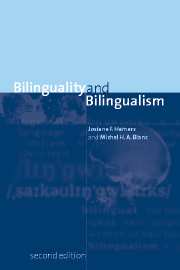Book contents
- Frontmatter
- Contents
- List of figures
- List of tables
- Foreword to the second edition
- Preface
- Introduction
- 1 Definitions and guiding principles
- 2 Dimensions and measurement of bilinguality and bilingualism
- 3 Ontogenesis of bilinguality
- 4 Cognitive development and the sociocultural context of bilinguality
- 5 Social and psychological foundations of bilinguality
- 6 Neuropsychological foundations of bilinguality
- 7 Information processing in the bilingual
- 8 Social psychological aspects of bilinguality: culture and identity
- 9 Social psychological aspects of bilinguality: intercultural communication
- 10 Societal bilingualism, intergroup relations and sociolinguistic variations
- 11 Bilingual education
- Conclusion
- Notes
- Glossary
- References
- Subject index
- Author index
4 - Cognitive development and the sociocultural context of bilinguality
Published online by Cambridge University Press: 31 October 2009
- Frontmatter
- Contents
- List of figures
- List of tables
- Foreword to the second edition
- Preface
- Introduction
- 1 Definitions and guiding principles
- 2 Dimensions and measurement of bilinguality and bilingualism
- 3 Ontogenesis of bilinguality
- 4 Cognitive development and the sociocultural context of bilinguality
- 5 Social and psychological foundations of bilinguality
- 6 Neuropsychological foundations of bilinguality
- 7 Information processing in the bilingual
- 8 Social psychological aspects of bilinguality: culture and identity
- 9 Social psychological aspects of bilinguality: intercultural communication
- 10 Societal bilingualism, intergroup relations and sociolinguistic variations
- 11 Bilingual education
- Conclusion
- Notes
- Glossary
- References
- Subject index
- Author index
Summary
The relation between bilinguality and cognitive development must be viewed in the wider framework of the relationship between language and thought in contemporary theories of behaviour. Furthermore, important empirical studies in the latter part of the twentieth century point to the relevance of the sociocultural context for the cognitive development of bilingual children. In the present chapter we discuss first the state of the art on the relationship between bilinguality and cognitive development; moreover, we insist on the role played by the sociocultural context in this development. If we adopt the theoretical stand that language development and cognitive growth are intimately connected, then we must determine how relevant bilingual development is for intellectual growth and account for the empirical evidence concerning the cognitive development of the bilingual child. In other words, if, besides the fact that they master two languages, bilinguals are different from monolinguals, how and to what extent are they different? And how does it affect their cognitive development? Although in the present chapter we review the empirical evidence on the cognitive consequences of becoming bilingual, we start by discussing some general theoretical views on language development which can lead to a better understanding of this relationship. The relationship between bilinguality and cognitive processes is further discussed in Chapter 5.
BILINGUALITY AND COGNITION
Whether one considers that language plays an important role in the development of thought or whether both are seen as developing independently of each other will influence the extent to which bilinguality is considered as a relevant factor for the development of cognitive processes.
- Type
- Chapter
- Information
- Bilinguality and Bilingualism , pp. 82 - 109Publisher: Cambridge University PressPrint publication year: 2000



